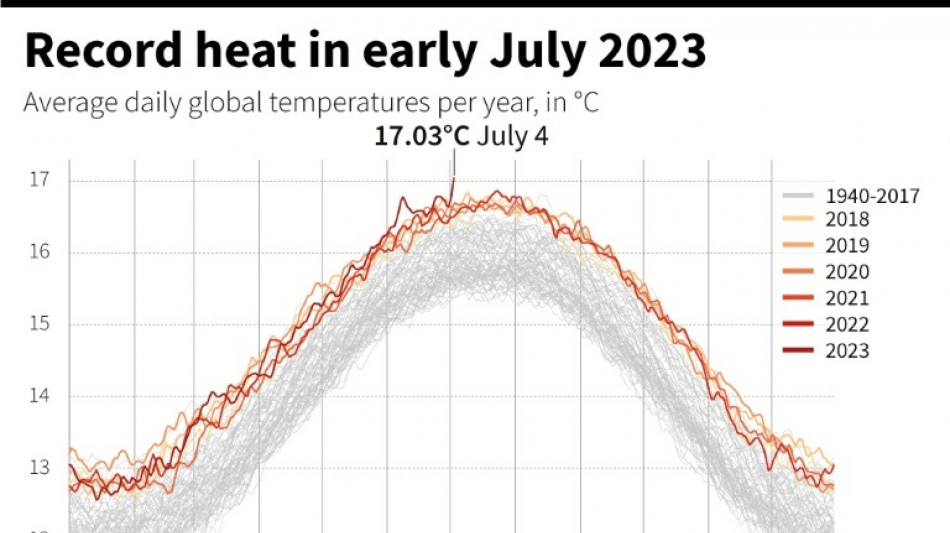
-
 City officials vote to repair roof on home of MLB Rays
City officials vote to repair roof on home of MLB Rays
-
Rockets forward Brooks gets one-game NBA ban for technicals

-
 Pentagon watchdog to probe defense chief over Signal chat row
Pentagon watchdog to probe defense chief over Signal chat row
-
US tariffs could push up inflation, slow growth: Fed official

-
 New Bruce Springsteen music set for June 27 release
New Bruce Springsteen music set for June 27 release
-
Tom Cruise pays tribute to Val Kilmer

-
 Mexico president welcomes being left off Trump's tariffs list
Mexico president welcomes being left off Trump's tariffs list
-
Zuckerberg repeats Trump visits in bid to settle antitrust case

-
 US fencer disqualified for not facing transgender rival
US fencer disqualified for not facing transgender rival
-
'Everyone worried' by Trump tariffs in France's champagne region

-
 Italy's Brignone suffers broken leg with Winter Olympics looming
Italy's Brignone suffers broken leg with Winter Olympics looming
-
Iyer blitz powers Kolkata to big IPL win over Hyderabad

-
 Russian soprano Netrebko to return to London's Royal Opera House
Russian soprano Netrebko to return to London's Royal Opera House
-
French creche worker gets 25 years for killing baby with drain cleaner

-
 UK avoids worst US tariffs post-Brexit, but no celebrations
UK avoids worst US tariffs post-Brexit, but no celebrations
-
Canada imposing 25% tariff on some US auto imports

-
 Ruud wants 'fair share' of Grand Slam revenue for players
Ruud wants 'fair share' of Grand Slam revenue for players
-
Lesotho, Africa's 'kingdom in the sky' jolted by Trump

-
 Trump's trade math baffles economists
Trump's trade math baffles economists
-
Gaza heritage and destruction on display in Paris

-
 'Unprecedented crisis' in Africa healthcare: report
'Unprecedented crisis' in Africa healthcare: report
-
Pogacar gunning for blood and thunder in Tour of Flanders

-
 Macron calls for suspension of investment in US until tariffs clarified
Macron calls for suspension of investment in US until tariffs clarified
-
Wall St leads rout as world reels from Trump tariffs

-
 Mullins gets perfect National boost with remarkable four-timer
Mullins gets perfect National boost with remarkable four-timer
-
Trump tariffs hammer global stocks, dollar and oil

-
 Authors hold London protest against Meta for 'stealing' work to train AI
Authors hold London protest against Meta for 'stealing' work to train AI
-
Tate Modern gifted 'extraordinary' work by US artist Joan Mitchell

-
 Mexico president welcomes being left off Trump's new tariffs list
Mexico president welcomes being left off Trump's new tariffs list
-
Tonali eager to lead Newcastle back into Champions League

-
 Lesotho hardest hit as new US tariffs rattle Africa
Lesotho hardest hit as new US tariffs rattle Africa
-
Stellantis pausing some Canada, Mexico production over Trump auto tariffs

-
 Rising odds asteroid that briefly threatened Earth will hit Moon
Rising odds asteroid that briefly threatened Earth will hit Moon
-
Italy reels from Brignone broken leg with Winter Olympics looming

-
 Is the Switch 2 worth the price? Reviews are mixed
Is the Switch 2 worth the price? Reviews are mixed
-
Ancelotti’s tax trial wraps up in Spain with prosecutors seeking jail

-
 Civilians act to bring aid to Myanmar earthquake victims
Civilians act to bring aid to Myanmar earthquake victims
-
US trade gap narrows in February ahead of bulk of Trump tariffs

-
 Stocks, dollar and oil sink as gold hits high on Trump tariffs
Stocks, dollar and oil sink as gold hits high on Trump tariffs
-
Countries eye trade talks as Trump tariff blitz roils markets

-
 Arsenal defender Gabriel out for rest of the season
Arsenal defender Gabriel out for rest of the season
-
Trump says US to emerge 'stronger' as markets tumble over tariffs

-
 Wiegman says Belgium games can aid England's women's Euros title defence
Wiegman says Belgium games can aid England's women's Euros title defence
-
Prosecutors demand jail term for Ancelotti for tax fraud

-
 Syria accuses Israel of deadly destabilisation campaign
Syria accuses Israel of deadly destabilisation campaign
-
Skiing World Cup champion Brignone suffers broken leg

-
 Iconic Paris hotel Lutetia taken over by Mandarin Oriental
Iconic Paris hotel Lutetia taken over by Mandarin Oriental
-
Nepal capital chokes as wildfires rage

-
 AI could impact 40 percent of jobs worldwide: UN
AI could impact 40 percent of jobs worldwide: UN
-
'Shocking': US tariffs worse than feared for Vietnamese exporters

| RBGPF | -0.41% | 67.72 | $ | |
| RYCEF | 0.2% | 9.8 | $ | |
| CMSC | -1.01% | 22.276 | $ | |
| NGG | 5.18% | 69.37 | $ | |
| RIO | -2.4% | 58.495 | $ | |
| RELX | 1.06% | 51.525 | $ | |
| BCC | -7.96% | 94.54 | $ | |
| VOD | 2.62% | 9.365 | $ | |
| BCE | 3.79% | 22.68 | $ | |
| SCS | -6.9% | 10.72 | $ | |
| GSK | 3.6% | 39.045 | $ | |
| JRI | -1.61% | 12.834 | $ | |
| BTI | 4.26% | 42.04 | $ | |
| CMSD | -0.71% | 22.67 | $ | |
| BP | -7.9% | 31.335 | $ | |
| AZN | 2.31% | 73.931 | $ |

World daily temperature records smashed -- here's how we know
World daily temperature records have been smashed this week, according to preliminary data.
The modeling tools that produced these estimates can provide an early warning of extreme heat events, even if they aren't as precise as monthly and yearly reports produced by leading agencies, say experts.
- Who is producing the data? -
The University of Maine has established an online tool called Climate Reanalyzer, which shows the curves of average global temperature for each day since 1979.
On Monday July 3, this curve reached a high of 17.01 degrees Celsius (62.62 degrees Fahrenheit). That record was surpassed on Tuesday with 17.18C (62.92F), and again on Thursday with 17.23C (63.01F).
Europe's Copernicus Climate Change Service, which has a similar tool, later confirmed the records of Monday, then Tuesday, albeit with slightly different figures -- 16.88C (62.38F) and 17.03 (62.65F), respectively.
- How do they arrive at their figures? -
The estimates are produced through a combination of actual temperature measurements -- from ground stations, satellites, and more -- with computer modeling.
The two tools are conceptually similar but differ in their exact sources and methods, leading to the slightly different results.
The University of Maine relies on public model output data produced by the US National Oceanic and Atmospheric Administration (NOAA) for forecasting.
NOAA, for its part, said that although it was seeing record warm surface temperatures being recorded at many locations across the globe, it could not "validate the methodology or conclusion of the University of Maine analysis."
NOAA instead vouches for its own monthly and annual temperature reports.
The fact that the both results converge is reassuring, Zeke Hausfather, a climatologist at Berkeley Earth told AFP.
The European tool is considered "very much state of the art," by the wider community, he added.
- What are the limitations? -
"These are estimates, unofficial records," University of Maine climate scientist Sean Birkel, who developed Climate Reanalyzer, told AFP.
"The greatest emphasis should be placed on an annual and monthly timescale," he added, with these reports subject to greater checks and verifications than is possible for daily records that rely on near real-time information.
On Thursday, Copernicus separately released its analysis for the past month, announcing it was the hottest June on record. A similar monthly report from NOAA is expected next week.
These reports are based "solely on observations" from the land and sea, and gather far more data points, explained Hausfather.
In general, climate experts prefer to focus on long-term trends and changes, in order to eliminate variations simply related to weather.
What's more, the concept of a global average temperature is a bit abstract and not necessarily as meaningful for the general public.
"No one lives in the global average," said Hausfather.
- What is the value of daily record estimates? -
Despite these limitations, the value of daily records is "we can start to identify extreme events," which could have climate significance, said Birkel.
Though temperature at the daily timescale is weather, not climate, adding in 40 years' worth of data provides important climate context, he says.
"These provisional records provide another piece of evidence of the global climate pattern shifts due to climate change and the evolving El Nino episode," said Omar Baddour, chief of climate monitoring at the World Meteorological Organization.
"I think this is a sign that we're heading into a very hot period. June was the warmest June on record by a pretty big margin," said Hausfather. "At this point, it looks increasingly likely that 2023 as a whole will be the warmest year since records began in the mid 1800s."
Ch.Kahalev--AMWN



